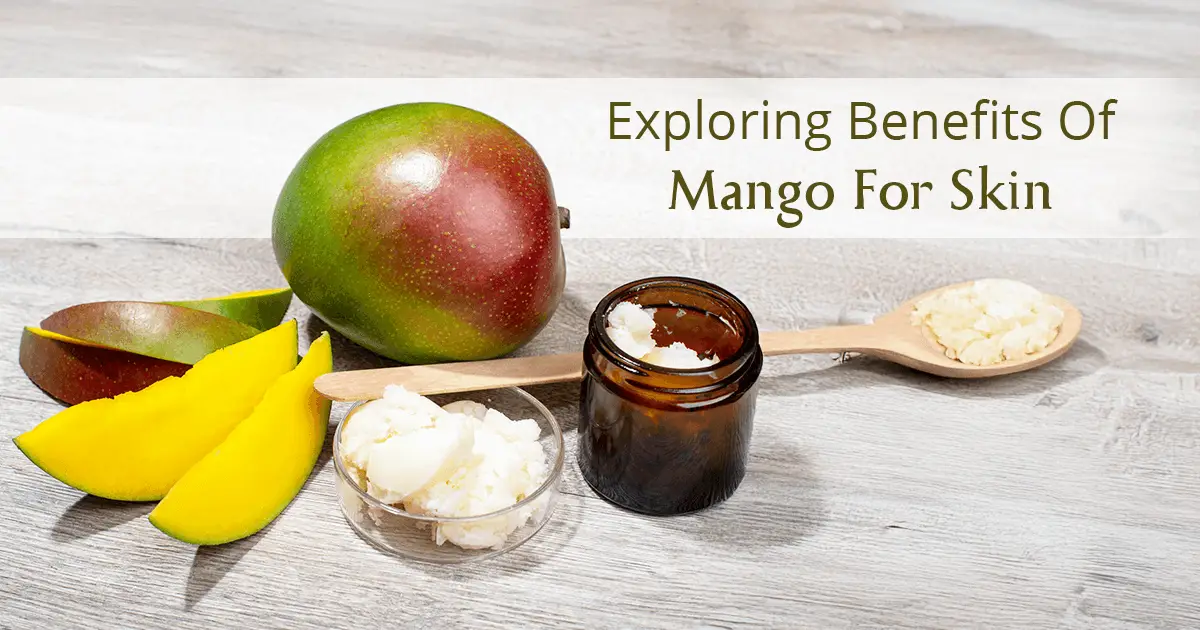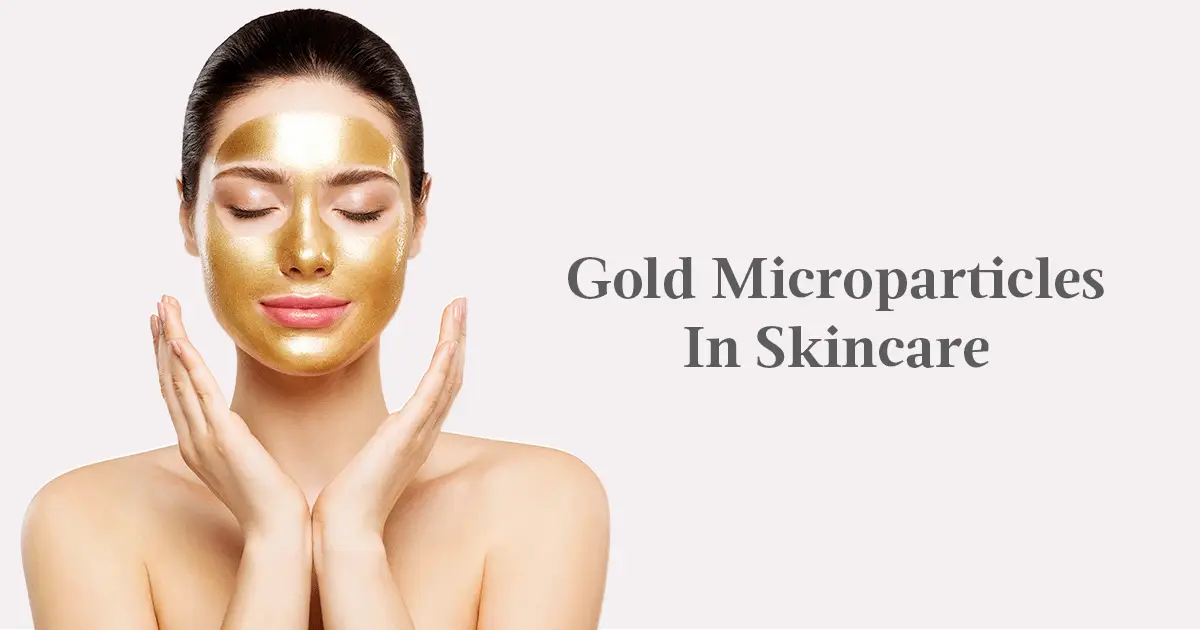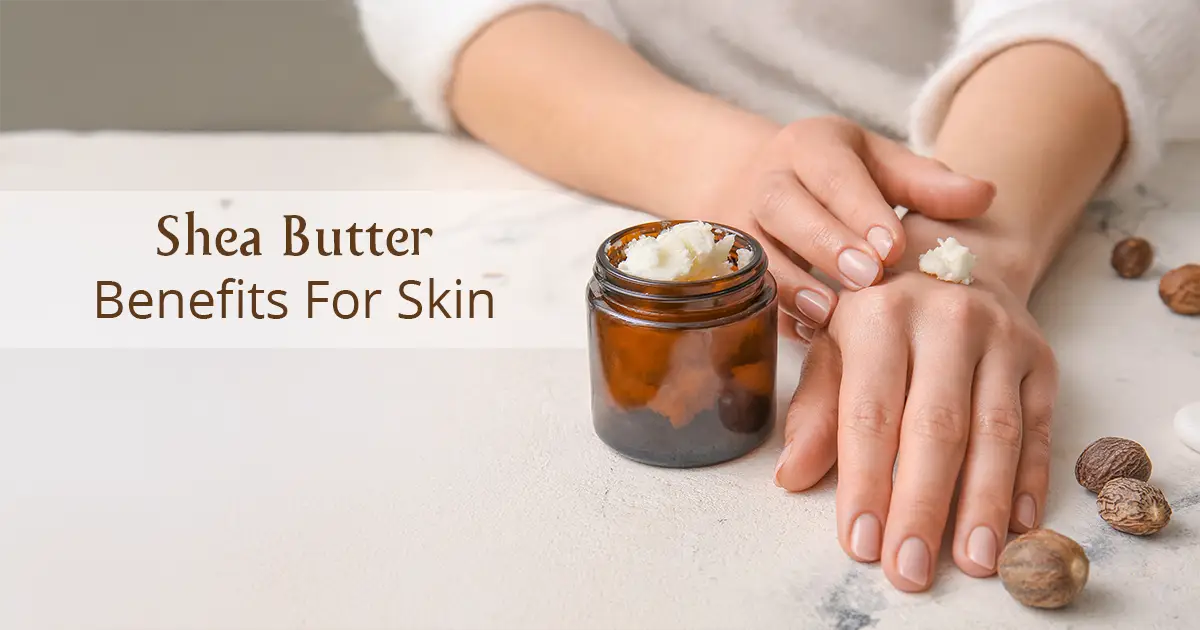
Every bite of this juicy superfruit feels like a tropical escape. But mangoes are more than just a tasty treat! They’re packed with vitamins, minerals, and antioxidants that can benefit your heart, gut, and even your skin.
As research uncovered more benefits of mango for the skin, skincare brands took notice. And this led to the creation of mango butter, a nutrient-rich extract from the fruit’s kernel. Just like mango, its butter is loaded with goodness and can work wonders for your skin.
In this blog, we’ll explore the skincare benefits of both mango and mango butter. Plus, we’ll share easy ways to add them to your daily routine.
So stay tuned!
Post Contents
[hide]
Benefits Of Mango Butter For Skin
-
Protects Against Sun Damage
Mangoes are rich in Vitamin A, which helps protect against the damaging effects of the sun’s UV rays. Being rich in magniferin, an antioxidant, mangoes also combat oxidative stress (due to free radicals) and prevent visible signs of sun damage.
-
Prevents Wrinkle Formation
If you’re looking for ways to get younger-looking skin, eating mangoes can be a great start. The fruit is known to prevent skin ageing and wrinkle formation by preventing degradation of skin fibres like elastin and collagen. These fibres are essential for maintaining the structural integrity of your skin and keeping it firm and youthful.
-
Prevents Skin Redness
Skin redness, or erythema, is a common concern often linked to sun damage. The anti-inflammatory properties of mango help soothe irritated skin, while its carotenoids are known to visibly reduce redness and inflammation, promoting a healthier complexion.
-
Reduces Irritation
The soothing properties of mango make it an excellent candidate for managing inflammatory conditions of the skin, such as eczema and psoriasis. Skin experts advocate the use of mango-based skincare products like mango butter for children and adults suffering from these skin conditions.
-
Softens Skin
Mango butter is an excellent emollient which can do wonders for your skin. When applied topically, it forms a protective layer on your skin, preventing water loss and strengthening the skin’s natural moisture barrier. Overall, it can be a great way to achieve smooth, hydrated and silky-looking skin.
-
Reduces Scar Formation
Mango butter supports wound healing by promoting skin regeneration, which helps reduce the appearance of scars. Its rich blend of fatty acids and antioxidants nourishes the skin, aiding in tissue repair and improving elasticity. In addition to speeding up wound recovery, mango butter helps restore worn and damaged skin, leaving it smoother and healthier over time.
Mango Butter Vs. Shea Butter: What Should You Choose?
Both mango and shea butter are excellent moisturisers and can be extremely beneficial for your skin. But they have their own sets of unique features and benefits which we’ll be highlighting in the table below:
|
Feature |
Mango Butter |
Shea Butter |
|
Source |
Extracted from mango seed kernels |
Extracted from African shea tree nuts |
|
Appearance |
Pale yellow in colour |
Ivory white in colour |
|
Texture |
Light, non-greasy, absorbs quickly |
Rich, creamy, slightly greasy |
|
Moisturisation |
Intense hydration, best for dry skin |
Intense hydration, best for very dry skin |
|
Skin Benefits |
Prevents sun damage, reduces redness, improves elasticity |
Heals cracked skin, fades scars, relieves eczema |
|
Fatty Acids |
High in oleic & stearic acids |
Rich in oleic, stearic & linoleic acids |
|
Nutrients |
Packed with vitamins A, C & E |
High in vitamins A & E, protects skin barrier |
|
Best For |
Sensitive, eczema-prone skin |
Very dry or ageing skin |
|
Uses |
Face & body lotions, baby moisturisers, lip balms, hair masks |
Body butters, healing balms, baby creams, stretch mark creams |
Benefits Of Shea Butter For The Skin
Like mango butter, shea butter is also a nutrient-rich concoction that can have incredible benefits for your skin.
- It traps the skin’s moisture and prevents transepidermal water loss, thereby resulting in plump, hydrated skin.
- It’s anti-inflammatory and can be used for calming damaged or sunburnt skin.
- Being rich in antioxidants, it can also be used as an anti-ageing treatment for dealing with skin wrinkles and fine lines.
- It’s an effective solution for managing skin conditions like eczema.
How Often Should You Use Mango Butter For Your Skin?
As mentioned earlier, mango butter can be used as a moisturiser as well as a sunscreen. For best results, you can apply it after a shower while your skin is still moist. Focus on particularly dry areas like elbows and knees to get smooth, hydrated skin.
Mango Oil & Extract: More Ways To Add Mango To Skincare
Both mango butter and mango seed oil are derived from the mango seed kernels. They are essentially the same when it comes to their nutritional properties and skin benefits.
Mango extract, on the other hand, is prepared from the fruits of the mango. It’s rich in carbohydrates, carotenoids, vitamins and hydroxyacids. Skincare companies often use mango extract in the preparation of several perfumes and lotions. It’s primarily used in anti-aging products, moisturisers and exfoliators.
Safety Considerations While Using Mangoes For Your Skin
Mango butter is generally considered safe for use on the skin. According to the EWG (Environmental Working Group), the butter has a low allergy and immunotoxicity potential. It also has a low risk for causing reproductive and developmental toxicity when used by pregnant women.
However, just like most other skincare products, it’s always advisable to do a patch test before using it on a larger skin area. Some sources also suggest that certain seed butters, being rich in fats, may clog pores and cause or worsen acne breakouts.
Final Thoughts
Mango can be a healthy and tasty addition to your diet. But let’s not forget the benefits it has for your skin. The mango seed butter is loaded with nutrients and antioxidants, which work together to make your skin smooth, hydrated and overall beautiful.
So the next time you are on the hunt for a natural moisturiser or a skin protectant, look for products that contain mango butter.
Note: Always remember to consult a dermatologist or do a patch test before using any new skincare product.
Frequently Ask Questions
1. Is Mango Good For Skin Whitening?
Mango is rich in antioxidants that help protect skin against sun damage, fade spots and improve overall skin tone. So while it won’t bleach your skin, regular intake or topical use can make your complexion appear brighter and more even.
2. What Happens If I Eat Mango Daily?
Eating mango daily (in moderation) can be great for your health. It will boost immunity, improve digestion and keep skin hydrated and glowing.
3. What Does Mango Do To My Face?
When applied to the skin, mango pulp or extracts may improve overall texture and brightness. Regular topical use can help reduce dullness, support hydration, and minimise early signs of ageing.
4. Is Mango Rich In Collagen?
Mango doesn’t contain collagen as such. But the fruit is rich in vitamin C, which your body needs to produce collagen. That makes it a skin-nourishing fruit that supports firmness and elasticity from within.
5. Which Fruit Is Best For Skin?
Fruits like mango, papaya, berries, and oranges are great for the skin. They’re rich in vitamins, antioxidants, and water content. Therefore, they can be great for keeping your skin bright and youthful.











